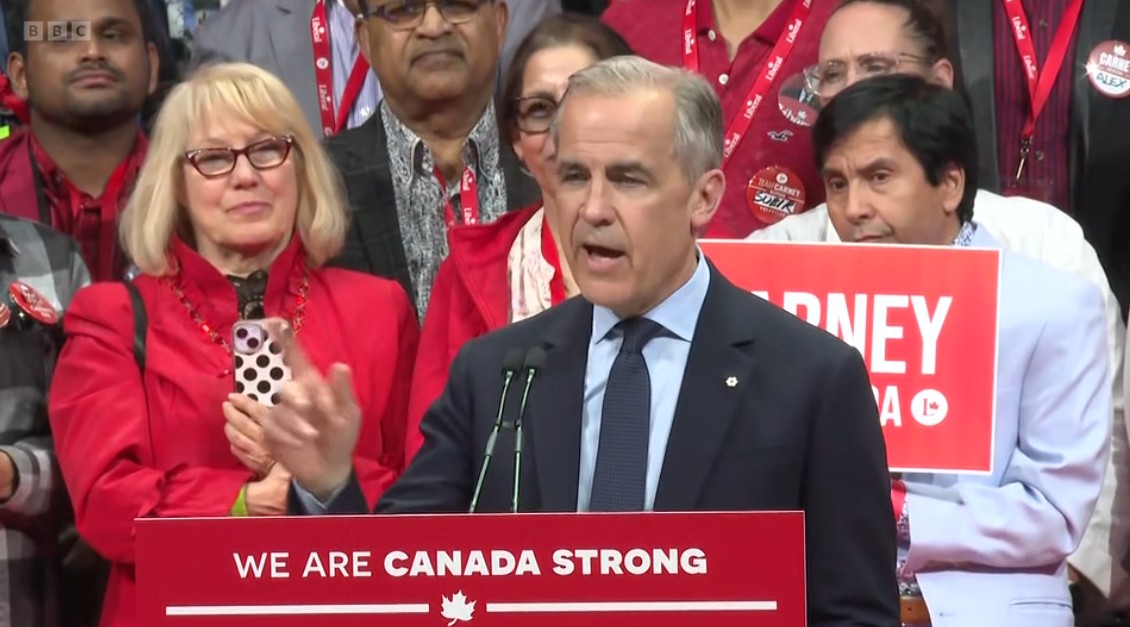A Night of High Stakes: How Mark Carney and the Liberals Turned U.S. Tensions into a Stunning Comeback

It was just after midnight in Ottawa when Mark Carney, flanked by his wife and a sea of red-clad supporters, took the stage to claim victory. The air in the ballroom was electric—part relief, part defiance, and wholly Canadian.
“America wants our land, our resources, our water, our country. Never,” Carney declared, his voice rising above the cheers. “President Trump is trying to break us so that America can own us. That will never, ever happen”.
For many in the room, and across the country, this was more than a political win. It was a statement of sovereignty, a collective pushback against months of escalating threats from south of the border. The 2025 Canadian federal election, once expected to be a quiet affair, had become a referendum on the nation’s relationship with the United States—and on the very idea of what it means to be Canadian.
From Underdog to Victor: The Carney Effect
Just a few months ago, the Liberals trailed the Conservatives by nearly 30 points. The party, battered by a decade of Justin Trudeau’s leadership and a restless electorate, seemed destined for defeat. But then came the Trump factor. In a series of bombastic statements, President Trump threatened to annex Canada, slapped tariffs on Canadian goods, and revived the old specter of making Canada the “51st state.” Suddenly, the election was no longer about inflation or housing—it was about national survival.
Carney, a former central banker with a reputation for calm under pressure, seized the moment. His campaign pivoted hard, framing the vote as a choice between capitulation and resistance. “We are over the shock of the American betrayal, but we should never forget the lessons,” he told supporters, echoing the anxieties of millions.
The Voters Speak: Stories from the Ground
In Toronto, I met Reid Warren, a software engineer who had never voted Liberal before. “Poilievre just sounds like a mini-Trump,” he said, shaking his head. “I’m worried about the economy, but I’m more worried about losing our independence.” In Mississauga, sisters Laiqa and Mahira Shoaib were less convinced. “The Liberals have weakened the economy,” Mahira argued, “but Trump’s threats are just too much. We need someone who can stand up to him.”
The sentiment was echoed in polling stations from Vancouver to Halifax. For many, the election became a gut check—a moment to decide what kind of country Canada would be in the face of external pressure.
The Numbers: A Minority Mandate, But a Clear Message
As the results rolled in, it became clear that the Liberals had pulled off a remarkable turnaround. With 155 seats won and 12 more leading, Carney’s party was projected to form a minority government, outpacing the Conservatives’ 137 seats. The Bloc Québécois, NDP, and Greens trailed far behind.
Conservative leader Pierre Poilievre, who had once seemed destined for the prime minister’s office, lost his own seat in Ottawa—a stunning reversal for a career politician. In his concession speech, he tried to rally his party, but the mood was somber. “Change is needed, but is hard to come by. It takes time, it takes work,” he told supporters.
The Trump Factor: How U.S. Rhetoric Shaped the Campaign
It’s impossible to overstate the impact of Trump’s rhetoric on this election. In the final weeks, his threats of tariffs and annexation dominated headlines and dinner table conversations. “These are not idle threats,” Carney warned. “President Trump is trying to break us so America can own us. That will never, ever happen”.
For some, the fear was personal. Duncan Garrow, a small business owner in Calgary, told me he’d lost sleep over the prospect of new tariffs. “We’re already struggling,” he said. “If Trump gets his way, it could ruin us.”
What Comes Next: Challenges and Opportunities
Carney’s victory speech was both a celebration and a warning. “Challenging days are ahead,” he said, promising to defend Canada’s interests while seeking new alliances in Europe and Asia. The new prime minister will have to move quickly—forming a cabinet, negotiating with smaller parties, and preparing for a high-stakes G7 summit in Alberta this June.
International leaders were quick to respond. European Commission President Ursula von der Leyen congratulated Carney, promising to “defend our shared democratic values, promote multilateralism, and champion free and fair trade.” Even President Biden weighed in, expressing confidence that Carney would be a “strong leader for the fundamental values and interests Canadians and Americans share”.
A New Chapter for Canada
As dawn broke over Parliament Hill, the sense of relief was palpable. For now, at least, Canada had chosen defiance over fear, unity over division. Mark Carney, the unflappable technocrat turned political leader, had become the face of a new Canadian resolve.
But the challenges are far from over. With a minority government and a volatile neighbor to the south, Carney’s real test begins now. As one voter in Montreal put it, “We’ve won the battle, but the war for Canada’s future is just beginning.”
